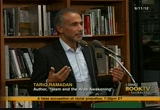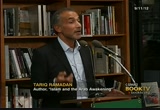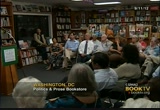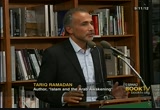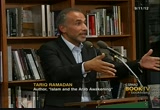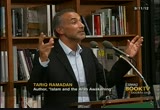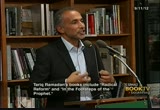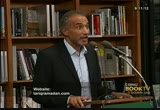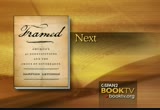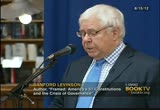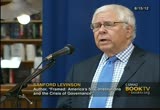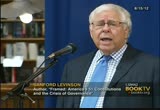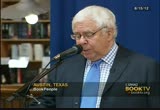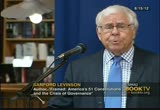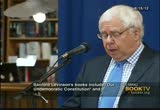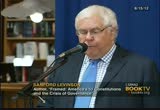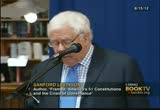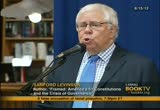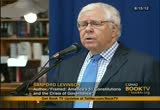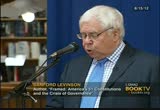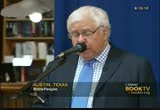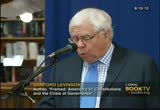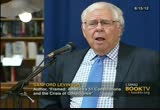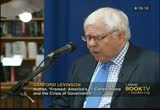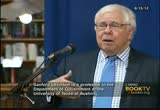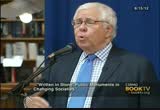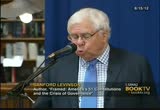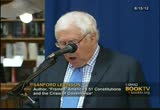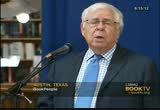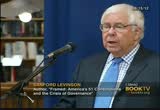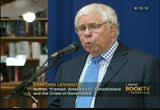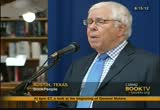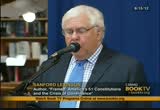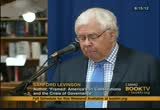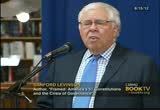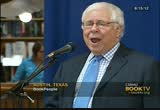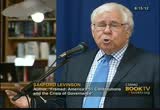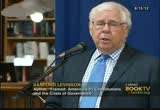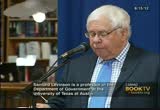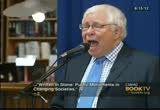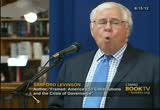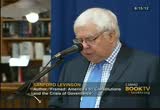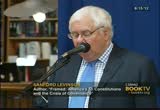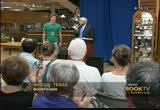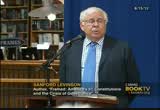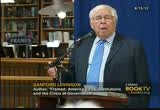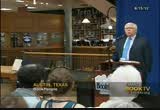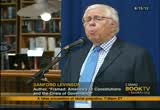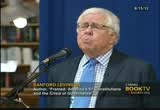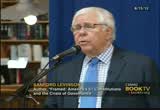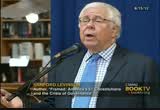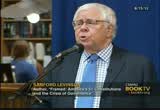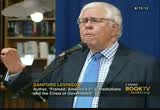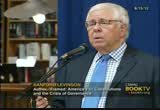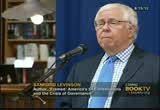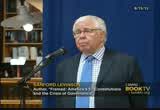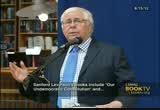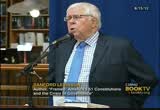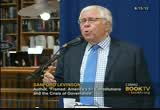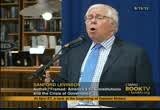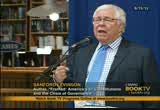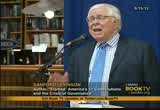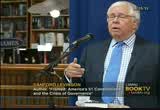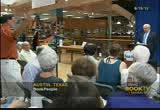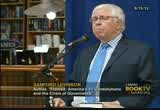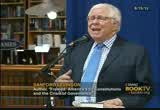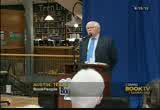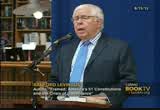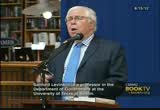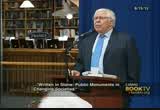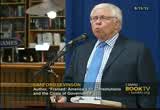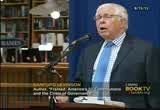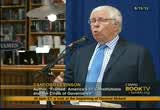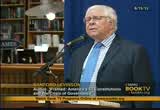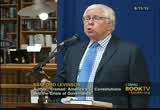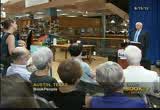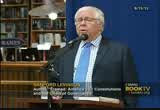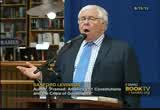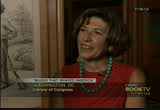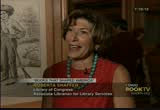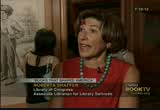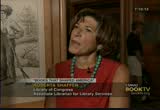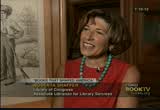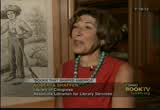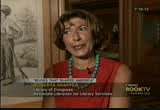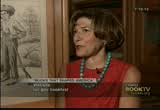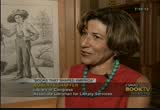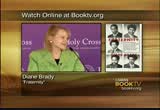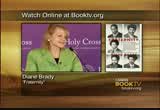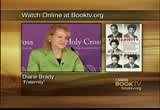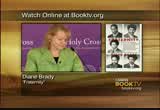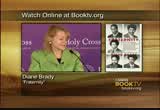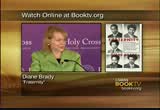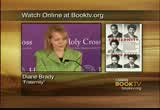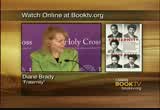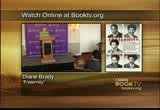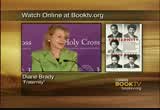tv Book TV CSPAN September 16, 2012 4:15pm-6:00pm EDT
4:15 pm
they are were so much rejected and demonized there is ab on session that we have to be acknowledged. to the west it's very important to be democratic and open and open to the civil society. so there is something which is an obsession of recognition. but that at the same time from within the society, they have a problem of credibility. they are "the guardian" of the religious reference. this is where they are dealing with tensions from within and it's very visible when you see what is happening with the young generations of, you know, the islamist. they are not happy with the older generation. this is where we should get this and promote something which is a long-term strategy. after one, two, or three months or one year after what happened in egypt to go straight and hope it's going change all of sudden. it's not going to.
4:16 pm
we have to be critically involved in the discussion about the -- [inaudible] whether you get to religious credibility by struggling with the list realist -- [inaudible] social justice this is where we have to challenge the people. but the problem is something which is one of the most important disease that we have in the arab world. which now is the coming international. it's emotional politics. it's we are driven by motions. this is the way you can play with islam this is exactly what the pop lis are doing with us in the west. they are playing with our motions to be scared of the other and scared of the muslim and [inaudible] listen to jihad. you are scared emotional politics is populous. you can be populous and religious. and you can be populist and [inaudible]
4:17 pm
and we have to be equipped. we need the intent yule jihad. i mean it. i mean it. an intent intellectual jihad if we are serious about democrat and rights we have to understand that we have to discipline our minds, meaning knowledge, meaning understanding the complexity, and resisting emotional politics with our communed. it's really don't get it so quickly. motions are misleading in the way we portray the others and in the arab world, when it comes to woman, you know, if you go in some muslim majority countries you speak about women rights. you are westernized. i'm sorry i'm not saying this because i come from the west. i say it in the name of islam. because you are not respecting the muslim principles. you are loses [inaudible] because you are on the defensive. the less you are western. the more you think you are muslims. that's wrong. that's completely wrong. so i think that we need to come
4:18 pm
with this critical to be equipped with this and you know what you can do having voices coming from this being saying i'm practice i muslim. the principle i'm have candidating and be involved in the discussion. not let the people tell us what is the fry slawfm and the right islam. we have to advocate. and the last question about dealing with power. of course. the [inaudible] and some of the literalist. this is an old tradition an old tradition [inaudible] you have it in buddhism. that when you are dealing with power, if you are serious about the religion you never resist power, you never challenge the power because this power is given by god. you have religion [inaudible] saying if you are dealing, you better deal with the bad leader than to create the -- [inaudible] is going to be worse than better
4:19 pm
stability than revolution. and you have this. so we have interpretation. you have other interpretations saying you have a just leader, you there to resist and remove him. he has to be accountable. you cannot sen an injust leader and you have to resist. the means you have to -- this is important is not [inaudible] the ref luges revolution is not always as easy as this. you can celebrate revolution, but nonviolent ways and i think that we need today -- i broad wrote about this in many of the books. for example, even, you know, in my way of resisting what is happening in israeli-palestinian conflict, my point was with he what happened [inaudible] a global movement with nonviolent resistance to israel. nonviolence which is something that is powerful now.
4:20 pm
you have so many means of communication. sometimes you to deal with the means. to understand nonviolence it's important. these demonstration were important because they were nonviolent. we have weapons we're not going to use them. they want to kill us, kill us. and they went. and i think? is powerful and very, very worried about what is happening in syria with people giving them weapons and say go do it. and coming once again from monarchies that are giving weapons and supported by others say we don't give them weapons, we give them means. so you have to think about it. so this is where i think from an islamic perspective, revolution could be a means if there is no other way. but we need to think about how do we get rid of dictators through resistance. nonviolence resistance and education. this is once again we also have to tackle. it's which kind of education we
4:21 pm
give. you are talking about if the muslim brotherhood are there, which kind of education. it's never, never perfect. we have always to reassess. because islamists have a specific way of educating but, you know, traditional islam, i was very concerned with [inaudible] is doing as an islamic institution in the way they're teaching. for example, so in the way we are coming with the understanding it's important to connect ethics in policy which is a way of understanding that as citizens who don't only have rights. you have duties and one of the duties is to be the counter power to power. any last article on my website is power to power. which way you resist power and you have to be self-critical. with yourself and power. this kind of understanding from an islam perspective is something that we have to right,
4:22 pm
we have to promote. it's not against the islamic principles. it's very much something that we find in our tradition. i would say it's more me a contradiction in terms to i'm a practices muslim and i will keep quiet in front of a dictator. the only right way of being a man and a woman of faith is to be courageous. to speak the word. i think this is what -- and sometimes you have in our democracy to be courageous. i would like the americans to be a bit more courage use with their government. [applause] is there a non-fiction author or bock you'd like to see featured on booktv? send us an e-mail at booktv at c-span.org. or tweet us. compared u.s. constitution to
4:23 pm
the constitutions of the fifty states. in the hour fifteen minute programs he argues in many ways the state constitutions are better. [applause] [applause] thank you. first, i very much want to thank the people who came out and thank those people who might be watching this on c-span, at any time day or night. whenever it is you are watching. i appreciate that. i was told by both my wife and daughter after presenting some earlier remarks in [inaudible] why in new york that i should make it much shorter. which i will try to do. my hope is to talk for about fifteen no longer than twenty minutes, and then reserve a lot of time for the questions and
4:24 pm
comments and counter arguments that not only do i suspect that some of you have, but griffin some of the people in the room i know without you who have in fact i welcome. this is, we're told, the most important election in our lifetimes. and it may be that more people believe that this year than believed in 2008, 2004, or 2000 or other elections when that is regularly said. for this to be true, among other things, elections must be decisive with genuine consequences, for the making of public policy, particularly [inaudible] we could have separate conversation about the issue of presidential power with regard to foreign policy, military policy. but let me say that my primary
4:25 pm
interest in the book and my remarks this evening is much more domestic policy and the extent to which elections do or do not bring us close to resolving important issues of the domestic public policy. for the older members in the audience. there has been at least one lek that did fundamentally change america, and that is 1964. a mere 48 years ago. when all of the stars were aligned, not only to create a landslide victory from president lynn ton johnson. richard nixon got a landslide victory. but a land slime democratic
4:26 pm
majority and let us not forget a supreme court the united states that was still authorly understand the control of liberal democrats. four two brief shining years, or perhapses -- [inaudible] if you don't like the great society, for two years for better or for worse, the united states had a government in the way that we often speak of her majesty say having a government. that is a group of people who can in fact implement a party platform that can be judged at next election or series of elections. that is not generally the way the united states operates. courtesy of the constitution drafted in 1778 and what i want to insist relatively unamended thereafter with regard to the basic structures that we live
4:27 pm
under. the republican presidents since president johnson that is nixon, ford, reagean, george h. w. bush not for a single day had even a single house of the congress from their own political party. i'm sorry region had the senator. he never a full congress that was republican. bill clinton did have a full congress that was republican, but of course, bill clinton was a democrat and so you had fragmented government, george w. bush had a republican congress for a total of a bit more of his four of eight years. bush scarcely has list domestic legislative accomplish thes -- perhaps the 2012 elections will
4:28 pm
generate a june fied government that will be able to pass the preferred programmings. but it would certainly be [inaudible] most likely according to most sobers that the time, is the more or less maintenance of the status quo. in which barack obama will continue to occupy the oval office, while the republicans don't control row number the house of representatives, the senate at this time. i think being up for grabs. so we should be open to the possibility the current election will fit the shakespeare began of sound and furry signifying nothing or very little. with with regard to the domestic policy, and that is what i'm focusing on. perhaps not nothing.
4:29 pm
consider the conclusions of tom freedman's column on "the new york times" on april 22nd of the past year. one of many in which he expresses great concern i certainly share about the health of our political system. he began by asking what some readers no doubt found inflammation question, quote, does america need an arab spring? unquote. his answer is basically yes, quote, we can't be great with as long as we remain a [inaudible] rather than a democracy. our deformed political system with a congress that's become a form for legalized bribery, is now truly holding us back, unquote. a have a to be sei allows what some could call special interest to prevent the passage of
4:30 pm
legislation both supported by majorities of elect rate, and in fact perhaps conducive to some coherent notion of the national interest. i began my prior book, on economic democratic constitution where the constitution goes wrong, and how we the people can correct it. refusing to sign a psychological at the national constitution center in phil fill that invites visitors to emulate the delegates who did sign the constitution instead of the three brave hold outs who did not. and i might interpret late that when we visited the national constitution center, just the past may, she took a picture of me with the three pulled outs. george, albert, and raldolf. many of the reasons for my own
4:31 pm
holding out in 2003 at the opening of the national constitution center, as suggested by the book's title our democratic constitution related to the fact that the united states constitution is in many ways remarkably undemocratic. not only when compared to almost any constitution written elsewhere around the world since the end of world war ii, but also with compared to the fifty other state other constitutions in america. the title -- the full title of my book framed the subtitle, america's 51 constitutions and the [inaudible] and one of the things that has now become a hobby of mine and in fact will be the brunt of a course i'll teaching in the fall at the harvard law school is that every student particularly
4:32 pm
at our so called elite law schools, which would lead their students and graduates to believe there is only one constitution in the entire united states. to realize that is false. each state has itself own institutions and one discovers contrary to the bad repute that state constitutions often have. particularly in elite law schools. that they're really often remarkably interesting. and without exception more domestic than the united states constitution. there is a controversy now among political science about the degree to which the united states constitution is continuing to serve as a model for countries around the world. that are drafting new constitutions. what i find much more telling is that the united states constitution to remarkable and
4:33 pm
relatively unexamined degree did not serve as a model for the state constitutions that were drafted in the country beginning around the turn of the 19th century. if you look at various new york constitutions, and other constitutions, you find very dramatic differences. the new york constitution makes it 46, for example, for better or worse when talking about constitution design what always has to say for better or worse. it is the new york constitution that lead the way to an elected judiciary. something, of course that we in texas are intimately familiar with. but returning to the united states constitution, for the moamght, my argument is that it is 1887 constitution established a set of institutions that
4:34 pm
worked systemly not only to minimize the practical importance of elections, by making it difficult to pass any national legislation, precisely because of constructing a -- [inaudible] system of checks ebb plans that is a fact institute. we have the equivalent of a tricamera legislature in the united states, and this is true incidentally of 49 of the 50 states. i'm a great admirer of nebraska, which has shown that it's capable to achieve a decent political order with only legislative house. so called camera. but what we have national level is a tricamera legislature, con consistent s is of a homed and
4:35 pm
indefensely a portion of the senate that gives the voter of vermont roughly 40 times the power of voters in texas. and single president at the stroke of a pen can render irrelevant the joint decisions made by both house and senate perhaps with significant majorities in each. but not the magic and relatively uncontainable number of two-thirds that is required to override a president obviously issue have aet to. we remember this year that even getting through a tricamera legislature might not be enough because we currently -- believe self-authorized to strike down legislation some people would say to serve as a forth legislative chamber. the united states under both democratic and republican
4:36 pm
presidents, declares and support for what i call democracy project around the world. we should reflect far more than we do on the fact that the united states at least so far is the national government is concerned scarcely meets the 21st century criteria of democratic rule. this is why freed month could seriously suggest that the united states might be the own -- [inaudible] of democracy. that being said, i have concluded that most americans don't care about democracy. either at home or abroad. a number of people caiment up to me after the earlier book, again, our undemocratic constitution, and reminded me some gently some not so, that didn't i realize professor
4:37 pm
leveson, that we weren't intended to be a democracy we are a republican and we should keep it that way. the people who said precisely that, i'm sure did not know that they were repeating the slogan of the john buncher society. i can testify for personal experience that it is very heavily wired in to the american political mind there is something dangerous about democracy which is instantly identified with tyranny of the majority. and we should embrace zen rate institutions that make it next to impossible for majorities to govern unless all of the stars are aligned in just the right way as they were between 1964, and 1966. so the fact that i'm critical of
4:38 pm
the united states constitution for being insufficiently democratic may mean only that i am too academic. and my approach in the constitution, and insufficiently appreciative of the benefits. after all barack obama is a candidate in 2008, set of the constitution that quote, it's worked pretty well for over 200 years, unquote. among other things, the come placen't assurance by our first african-american president noless, requires over looking a brutal civil war that lasted four years and killed a ton of people. a war that i'm sure many of you experienced as having occurred between semesters where the first semester of the american history course that you might have taken concluded in 1860, and then it picked up again
4:39 pm
perhaps in 1868 or 1877. this is actually the way american constitutional law is taught. that the 14 amendment appears by magic in constitutional law of course is with literally almost no time spent on how we got either the 13th or the 14th amendment which is much closer to what we suggest to chairman's motion that our constitutional power grows up a barrel of gun than be understood simply in the model that the 1787 constitution that suggests that any amendments would come through a nice calm and peaceful article v process where we deliberate on what would makes better and
4:40 pm
duothirds of congress says, yes, that's right and three quarters of the state legislature say we're with the program too. let's not describe how we got the so called row construction amendments. i would like to think that then candidates obama would simply engaging in opportunistic rhetoric given that almost literally the last thing he could afford to be perceived as either than or today was as a critic of the sacred foundational text. indeed, his opponent governor romney assuming he takes more seriously does infact treat the constitution as a say rid foundational text. that is the book of mormon says. so forget the fact that the constitution is woefully undemocratic. perhaps that truly doesn't
4:41 pm
matter. the new book begins and certainly free month's and my obsessional focus is on the degree to which people are fundamentally dissatisfied or worse, with 0 current operations of the american system of government. how many of you, for example, agree with the 61% of polled americans at beginning of the month that the country is going the wrong direction? and that the political system is bruting an inned a dwoit engage in necessary turns of course. whatever your own major concerns might be. were you a drought stricken farmer you would i suspect be furious beyond belief at the irresponsibility of the present congress busy taking an election campaigning recess instead of
4:42 pm
attending to those national priorities. some of course tie the drought to cause global warming. one sees a totally nonresponsive congress. if one is more on the administrator right, and i would insist that my book independently of my own political views is not written as a left-wing tract because it seems very, very clear that the tea party, for example, is also justifiably outraged at the inability of the american point system to respond to a number of its issues that legitimately regards as important including a careening national debt, and the inability of congress seem belie genuinely to get any control of
4:43 pm
ever increasing medical expenses that could in fact bankrupt the national economy if something isn't done. i'm glad obamacare passed, i'm glad the supreme court upheld it. but i think that almost nobody believes that it provides a genuine solution to the very, very genuine problem of inefficiency in the florida care system with regard to costs. remarkably few people these days look at the con contemporary united states government with the basic structures with any genuine -- reveal that only 17% of americans approve of congress. 76.5 disapprove. this actual represents a slight uptick of approval given that in
4:44 pm
september of 2011, "the new york times" published an article approval of congress matches record low of 12%. just as the gallup poll reported the same month that, quote, americans express historic negativity toward u.s. government, unquote, noting that 81 percent of the polled were quote, dissatisfied, unquote the way the country is being governed. perhaps most shocking was an august 2011 finding that only 17% of those surveyed said that the present national government actually possesses consent of the government. americans are currently remarkably distrustful of the basic constitutions. including for that matter and in some precedented way the united states supreme court which in the most recent polls now has
4:45 pm
the approval of fewer than 50% of the american people usually the supreme court significantly higher than so the called political branches but again for better or worse, i think more and more americans view the supreme court as just a another political branch and don't like all that what they see. the one exception to the trust the american military which has the relatively strong confidence of 78% of the public and the confidence of 94% of the public if one summerly adds some confidence to those with strong confidence. this is one reason why if president obama does win in november, which i expect him to do, i would make a bet that the
4:46 pm
president inaugurated in january of 2017, will be david petraeus. because he will be the person in whom americans will have any confidence at all whether or not t merited which is a subject for another presentation. i wonder a lot seriously if so few americans had we been able to poll them in 1776 would have compressed approval by more confidence in the british parliament of king george iii. there were, after all, lot of -- [inaudible] that's where canada basically coming from. expressions about the disfunctionalty or even pathology of the american political system have become a staple of con temporary pound
4:47 pm
try. -- wrote that quote, the downgrade reflects our view that the effectivenesses, stability, and predictability of american policy making and political institutions have weak end at the time of ongoing fiscal and economic challenge. unquote that is they did not say that the american economy is collapsing and just didn't warrant the trust of the investors. rather what they said is that the american political system is collapsing. insofar as as the health of the american economic system does depend on decisions made by the person political system then investors should in fake lose some of the confidence they might have had.
4:48 pm
what is missing though from the able cease of free month and ors? is it ability to connect the dots between our institutions and the constitution that created them? we are create -- we are treated the constant criticism of our leaders both those who inhabit public office and those who wish to and the unwillingness to comprise with one another. with a we do not adequately emphasize is that there may be nothing at all irrational about their behavior given the incentives created by the constitutional system and drafted in 1778 under assumptions what the political border would look like in 1887
4:49 pm
that were fundamentally to shown to be wrong no later than 1800 but that we have not in fact -- that we have addressed since then. my view, for example, is the late senator ted kennedy bears a genuine responsibility for electing george w. bush in 2004. very a simple reason. it it is kennedy who made possible the passage of both george w. bush signature domestic achiew.s no child left behind and the prescription drug law. i continue dare what you think of either of those laws on the knitter. what we do know is that president bush was able to run in 2004 not only as the leader of the war on terrorism, but also a republican who could in fact work with democrats to pass
4:50 pm
what was described as significant domestic that creasessed problems of education and medicare. johnmitch mcconnell told us prepeededly in 2012 and it is readily understandable why he does not wish to emulate senator kennedy and thus enable obama's re-election indweed one could also say that gingrich made a mighty contribution to reelecting bill clinton in 1996 by giving him a welfare bill that perhaps he was surprised to discover that clinton would find.
4:51 pm
and the republican legislation. that gingrich passed what we learned is that american irrationally fixated on the president and blame or praise the president for whatever happens. congress gets very little credit or should i say more to the point the presidential candidate of a opposition congress that works with well with a president that get the little credit for their god sportmanship. what they do is re-elect the incumbent president. one cannot blame mitch mcconnell for desiring not to re-elect a democratic president. with a one can blame is the
4:52 pm
framers in 1787, and [inaudible] for failing to recognize the implications of the developing a parliament tear party structure in a system of so called checks and balances that was designed for rule by virtuous public interested politicians who would not submit to the temptation of what madison called franksal politicking. including makes decisions on the basis of what will most help your political party rather than what will necessarily help the country. after praising free month for the diagnose of america's condition, let me conclude by offering some severe criticism
4:53 pm
of his limitations. in free month's recent best seller which assume is on sale called -- coauthor that used to be us how america fell behind in the world invented now we can come back. we find the statement that, quote, for america's remarkable history, the constitution deserves a large share of the credit, unquote. they call for shock therapy, this is their turn to alleviate what they call, quote pa thotle, unquote. they also write the country does not quote need fundament changes to the system of government. a system that served it well for more than a two century and proven equal to the task of coping with a seeder series of major challenge. he is usually careful to -- you can there there is not an ounce
4:54 pm
of evidence in his book for the proposition that we center been served so well by the constitution. maybe we have. but what would like to see with the evidence is. but what would truly be remarkable is that if the constitution has only served us well and never one in the 225 years had had any defects that. the perhaps didn't serve well. even iowa can see that the constitution on occasion was probably all right, and maybe really very good. [laughter] but as i say, it seems to me just remarkably fapt fanciful to say as he does that it serves us well for more than two century and proven equal to the task of coping with a series of major challenges unless you view the
4:55 pm
war that killed 70,000 people and was a war that was fundamentally caused by the constitution not simply inspite of the constitution that that is summerly a blip that can be overlooked in the presentation of constitutional try yomp. these assertion a photoly unreflective unconstitutionallal faith that ignores the possibility of the constitution that whatever the acknowledged benefits might have significant costs as well. free month is often extremely incisive when he writes of the difficulties posed by the respective constitutions for such countries adds egypt, lebanon, iraq, afghanistan or tour keep. it is only when he turns to the own country that his acuity seems to disappear in favor of general initiation of the political system as if our
4:56 pm
political system has nothing to do with the constitution that gave it life and preserved the fundamental force. framed concludes was acknowledges. after mentioning many people, some of them in the room, who directly contributed to the ideas and writing of the bock we mention my three grandchild, rebecca, eel will, and the now 1-year-old sara. none made a direct contribution to the book but all, quote, deserve recognition however as splendid people. more over, they are truly the source of my passion concerning what i call in the title th crisis of governments and contemporary america and the role played if only margely by the 51 constitutions in the united states in making it more difficult to resolve the
4:57 pm
problems that will dominate the futures. they deserve better, unquote. all of our families wees the strangers with whom we are connected as well as citizen and inhabits of the united states not to mention strangers around the world who are affected by decisions made or not made by the united states government to serve better. many of us ared a an age that quite frankly it might not really matter what happened or does not happen as a result of the next election. would such complains be plausible with with regard to the our children and grandchildren? i suspect that some of you have questions, comment, denunciation and i certainly look toward to them. yes. thank you. [applause] [applause]
4:58 pm
we have the microphones. your questions could end up on tv. c-span is in fact, again, let me trust the grad constitute once more is filming this. if you would go the microphone. >> right. yeah. they can pick up everything you say. i have a simple question. give your analysis, what's the solution? >> excellent question. perhaps on the prips. if you're going -- [inaudible] you may as well hang far sheet. my solution is to support calling a new convention. we haven't had one for 225 years, and the 1787 constitution doesn't contemplate the possibility. one of the things i like so much about american state
4:59 pm
constitutions is that they often welcome new conventions. they are have been about 225 state constitution conventions over the last 225 years. each state has had just short of an average of three constitutions. not only they do they amend their constitutions but with some frequency they actually replace them when they come to the conclusion that the old constitution is no longer fitting for the current time. somebody who may remember, there was a texas constitution convention in 1972 that was supported by texas political elite and it went down in public referendum in fact many proposals do. but i would very much like to see a serious national conversation of that would
5:00 pm
certainly be on c-span, it would be become the ultimate in reality television. and, i mean, that all together seriously where our fellow citizen would discuss what is the state of our current political system? and does it need some significant changes? a couple of points on this. i look at the great successes of the last 0 years in solving what seem to be insure insurmountable policy problems. they got together and gave sufficient [inaudible] to do something and i'd like to think that when things get serious enough and [inaudible] inclusions occur. and turning over the rock on the tea party as ryan does may well solve the problems. ..
5:01 pm
>> if ryan had, in fact, voted for the simpson-bowles proposal, and if they had gotten through congress with president obama's support, obama would get the credit. and he would be waltzing to, you know, a piece of cake re-election. so i do think, and there's actually a third problem that should be mentioned. peter orszag, the former head of the budget bureau, wrote an op-ed in "the new york times"es saying, basically, contra my own
5:02 pm
instincts, the problem with the united states is there's too much democracy. we can't get anything done if we actually try to do it through elections and democratic procedures, what we need are ever more expert commissions that will make decisions for us. now, maybe that's true. but it should be recognized that if that is the solution to our problems, then we should stop prattling to other countries around the world that what they need is more democracy because, in fact, we would have come to the conclusion that democracy doesn't really work. >> sandy, i really welcome this. i think my understanding is that the time of the federalist papers in our constitution, 1787 and so forth, grew out of a lot of studies of the constitution across time and across countries and so forth. so that grew out of serious
5:03 pm
study of other good constitutions. now, what you're proposing, i think, is this constitutional convention which i find quite interesting, and i think your knowledge of the 51 state constitutions as well as the others you looked at would give you a perspective which would be extremely useful in such a constitutional convention. and so based on everything you've seen and known to date if you could propose three things for a new constitution, the three most important changes to today's constitution, what would those be? >> let me take your word "proposal" quite literally. i mean, there are certain issues that i have very strong views on that at the end of the day might not be all that important like, for example, getting rid of life tenure for members of the united states supreme court. they should have single 18-year terms. but that's small beer when we're
5:04 pm
talking about fundamental change. so let me suggest proposals that i would like to see argued out on c-span. and incidentally, let me also say because another question some of you might already have in mind, well, where would the delegates come from. and i have an answer to that, and it's based on a wonderful book written by paul woodruff called "first democracy," which, in fact, returns to ancient athens and suggests that we select more leaders than we do by lottery. now, whether or not the house and the senate should be selected by lottery, we can debate. but it seems to me that it would be wonderful to select members of a convention by lottery, basically a nationwide citizen jury, and then the three
5:05 pm
proposals i would like to hear them discuss -- not necessarily in order of importance. first of all, how do we adjust institutions developed in 1787 under the assumption of rule by be9/11 lent -- benevolent political elites who would more or less share a notion of the public interest? how do we make those institutions congruent with the kind of party structure you see in parliamentary systems across the world? so my proposal would be maybe we should emulate the canadians. maybe, in fact, um, they made the better response -- loyalist though they were -- by going the route, ironically enough, that the british went in the 19th century toward parliamentary
5:06 pm
government rather than stick with the separation of powers structure. we have -- now, i don't have pound-the-table views on this, but i would propose it because i think it really does need to be discussed. secondly, assuming we stick with a separation of powers system and a bicameral system so that we have a house of representatives and we have something called a senate, i despise the current senate, but i'm not opposed to bicameralism per se in a country this large. indeed, i think even a state as large as texas probably benefits from a second house. i don't think minnesota does. i supported governor jesse ventura when he said that minnesota should emulate nebraska. but we're much larger. but i think bicameralism's enough so that another proposal
5:07 pm
would be either to eliminate the presidential veto in substantial respects or at the very least to make it far easier for congress to override presidential vetoes. um, overall -- presidential vetoes are upheld roughly 95% of the time. it seems to me that's too high a success rate. i don't know what the right success rate should be. i would like to hear a debate about this. in certain aspects you might want to strengthen the presidential veto. the texas governor -- again, for better or worse, the audience will say that especially talking about texas -- [laughter] texas governor has a line item veto. now there's actually something to be said for line item vetoes if you're concerned about earmarks and the like. so the whole veto system it's
5:08 pm
not just one thing, a collection of things. i would like to hear, you know, hear in this debated. the third proposal again assuming that we stick with a separation of powers system is that we be able to fire a president in midterm. the impeachment system has been an utter failure, basically. partly because it's been captured by lawyers. and so we shout at one another about what constitutes a high crime misdemeanor. i'm not fond of presidents who are criminals, but quite frankly, i don't think that's the greatest threat to the american political system. i think a far greater threat is having a president in whom one has lost fundamental confidence with regard to issues of war and peace, life and death.
5:09 pm
and so each if we don't -- even if we don't go the full parliamentary route, i would like to see a system whereby congress perhaps by collective two-thirds vote can vote no confidence in the president and require the president's replacement by somebody from the president's own party. so you can't simply effect a party coum --coup, but at least get rid of a particular democratic president or a particular republican president that leaves you feeling sick in your stomach as you go to bed and as you wake up with regard to the qualities of judgment, with regard to certain transcendentally important issues. you know, i have others as well, but you asked for three, those are three.
5:10 pm
>> that's great. thank you very much. >> i think if we fired presidents in midterm, we'd have gotten rid of truman, reagan and clinton, so i don't know if that's really a good way to approach things. but what's fascinating is, first of all, i want to compliment you for putting your finger on a real problem. there is no question in my mind that if we got together in this room both those on the right and on the left, we would probably come to a reasonable agreement both on gun control, simpson-bowles, budget and the rest. but congress can't do that, president can't do that, and it's obviously disturbing the american people as reflected by the statistics you show. but the question i have is reflected by sort of the question you heard from your first three questioners and that is, okay, what specifically are you going to do to change it? what will the american people agree to? now, you've kind of thrown out two deals, one is about changing the president midterm which i'm not real happy with as you can
5:11 pm
tell from my first comment. the other one was changing maybe the veto power and what the statistics are. it seems to me you talk about state constitutions, and i gather you've really studied state constitutions. so my question to you is, what state constitution has really worked, and when you tell me the state constitution that has really worked, what specific amendments to the constitution do you think the american people would agree on? because you're absolutely right when you start off by putting your finger on the fact that the system doesn't work the way it should right now. >> um, really work scares me a little bit. [laughter] in part because that might suggest what i was criticizing friedman for doing, that a constitution will, you know, always work, or it will always lead us down the path toward the
5:12 pm
cliff. one of the most fundamental questions among political scientists is whether constitutions are important at all. because many would say, well, look, what's really important with regard to any political system is its economy, its degree of homogeneity, how many languages are spoken, how many different religions and what's the extent of the space and the hostility among the religions, how our natural resources are distributed is generally not a good idea for all of the resources to be found only in one part of a large country and things like that. so i don't want to overestimate the importance of constitutions or, therefore, to say, well, you know, here's the constitution that's really worked because, no doubt, there would be examples when it didn't.
5:13 pm
let me be truly heretical and say that one of the things i like about many state constitutions, and you find these especially in the west but not only the west, is the degree to which they allow some element of direct democracy. the united states constitution, 1787, was written by people who -- not to put too fine a point on -- fundamentally mistrustful to their core of democracy. james madison writes, very proudly, in the 63rd federalist that although the constitution is ordained the name of we the people, that will be the last time the people speak more or less directly, otherwise they will speak exclusively through elected representatives. now, if you look at a whole
5:14 pm
bunch of states, there are ways of doing end runs around elected representatives. many of you will immediately think of california, and many of you will say, well, that immediately makes this a bizarrely stupid suggestion because it is certainly the case that the california constitution itself helps to explain why that state is in its current desperate straits. but california isn't the only state in the united states that allows direct democracy just as there are states around the world including switzerland which most people find very dull and boring country that has referenda all the time. but think of maine for a moment. nobody ever -- most people don't think of maine ever -- [laughter] and when you do think of maine, you think of a dull and boring
5:15 pm
new england state. maine has a provision in the constitution that allows the electorate to put on the ballot, um, a referendum on recently-passed legislation. it's not california where the electorate can initiate legislation and pass legislation. rather, it is what might be called instead of judicial review, citizen review. now, twice in the last three years citizen review in maine has worked to overturn legislation for better and for worse. the first time in 2009, 53% of the maine electorate voted to invalidate a law passed by the maine legislature, signed by the maine governor that would have legalized same-sex marriage. i'm very sorry the electorate
5:16 pm
did that. last year the maine electorate overrode a law passed, again, by the maine legislature, signed by the republican governor that would have considerable my restricted the ability of people to vote in elections. and i was opposed to that and delighted when the maine electorate agreed. in ohio, another state that's usually not viewed as wild and crazy, there was a referendum in the most recent statewide election that overturned a public employees' union law that had been passed by, um, the legislature. wisconsin has just gone through a very melodramatic recall election. i actually like these sorts of things. i like the fact that the people can feel empowered to take
5:17 pm
control of their own government and to make the pitch to their fellow citizens. sometimes their pitches work, sometimes to my regret they don't work, but it is democracy in action. what we do, i think, is to overgeneralize from the experience of california, and then with california i return to what i was saying a few moments ago is the pathology of california strongly linked to their constitution, or is it explicable because a too-large state of 36 million people with very different economies in different parts of the state, very different cultures and maybe no constitution could, in fact, allow california to be governed effectively. now, as a matter of fact, i
5:18 pm
think the california constitution does explain some part of it. um, i don't believe any constitution explains what is going on in its entirety. political sign difficults are usually thrilled -- scientists are usually thrilled if they can establish that something will explain 5 or 10% of the, of what contributes to some phenomenon. my view is that the united states constitution explains 5 or 10%, but it's a very important 5 or 10%. a metaphor that i increasingly am fond of is to think of interaction effects among drugs where, you know, you take aspirin, you take this, that and the other, usually it's just fine. so long as you're taking them separately. but it turns out under some circumstances that the most innocent sort of drug that
5:19 pm
generally benefits you, like aspirin, can kill you in interaction with other drugs. and so it's really very, very important to know how drugs interact. my view is that the united states constitution under certain circumstances generates extraordinarily dangerous interaction effects. and i think one of the interaction effects is to create a general fallowness in the body politic that they really have no say in their government. we have elections, and they just don't really matter. if by mattering you would mean the ability of the winners to implement a program. >> let me just do a real short follow up. real concise, and if i get just a short answer then. your basic recommendation, okay, you think the american people would agree. maybe because it's not enough to say, well, a national discussion
5:20 pm
and a constitutional convention. your specific recommendation is some type of initiative and referendum for the u.s. constitution? >> some kind of direct democracy system. issuing a referendum is the strongest possible direct democracy, and there are good reasons to have second and third thoughts about the wisdom of going all the way down that road. but, yes, some form of direct democracy. one other point. i mean, how do we know what the american public would, in fact, agree with or vote for unless you really talk to them like adults and say we're in a pickle what is truly inspirational about the framers, and i always insist that i do not engage in founder bashing. they were smart men, and they were all men, who were trying to do their best at a time of
5:21 pm
genuine challenge. they wrote these, you know, newspaper scribes, the most famous of which the federalist papers, and really tried to address one another as serious adults. we don't do that. we have these 30-second ads, and, um, the whole notion that is conveyed about the american public is that we have to attention span and really cannot be addressed as serious adults. so, you know, what would happen if people actually had a sense that they were being taken seriously as members of an american public? maybe they'd agree with me, maybe they wouldn't. but my main obsession now is to
5:22 pm
generate the conversation that isn't happening rather than to try to sell you the 18-point levinson program because i don't have an 18-point program of things that i'm truly confident about as being the cure for what ails us. >> one thing that came to my mind when you were talking about especially the 51 constitutions is i hadn't heard any idea from -- i haven't read the book, sorry, but i haven't heard any idea in this speech about what your take on federalism overall because founders, of course, perceive the big distinction between state governments and national governments, and do you think this new constitution that would be created or any ideas on whether or not the power should be mainly toward the national government, state governments? i've heard -- i've read lots of things about whether or not the counties even the way they're set up are set up in a way to give -- [inaudible] >> i think that would be a central question in any constitutional convention. i started teaching courses at ut
5:23 pm
law school on federalism, and one of the really interesting things about the united states constitution is that it says astonishingly little about the so-called reserve powers of the states. you look at constitutions around the world and that are, you know, pro-federalism, and you discover that states or provinces in germany are given exclusive authority over language, over religion, over education, over environment, you know, fill in the blank. now, again, this is something that we could debate about at great length, but i assume it would -- that if you like federalism defined as some degree of subnational autonomy, that people can make decisions relatively free of national override, then our constitution does a dreadful job in
5:24 pm
protecting local awe on autonom. you might, on the other hand, believe in some areas we have too much local autonomy as a political matter and would want to address that in a constitution. you mentioned cities that are very, very interesting. texas is six times as large as the entire united states' population in 1790. we in austin especially are familiar with the tyranny of a centralized government in austin itself called the state government that often seems determined to deprive the city of austin of autonomy over matters that we hold near and dear. so i think that to the extent that federalism does stand for a principle of decision making at subnational levels and allowing
5:25 pm
people to participate in decisions that affect their lives, then any modern constitutional convention whether at the state or national level would have to address this. do we want home rule on the part of cities, or do we not? what kinds of protected autonomy do you want for states and what not? these are all wonderful subjects for a convention or for any sort of national convention. we're not having it. >> my question is based on a lot of the things that you said, i wonder what your take is on, i guess, who would support the kind of things that you're talking about given the fact that you have kind of a lot of people clamoring for change with the occupy movements and the tea partiers? >> very good question. a very common response to my earlier book, um, is some degree of agreement on the particular
5:26 pm
diagnoses and then utter disbelief that i could be serious in proposing a national convention. i get this from my closest friends and family as well as many others as well. [laughter] let me just, you know, short anecdote. there was a fascinating two-day gathering at the harvard law school cosponsored by lawrence lesic who has written his own cry from the heart about the present state of american politics where he focuses particularly on campaign funding. um, but it's can cosponsored by larry and by the patriot tea party movement. larry and i constitute maybe as much as half of all more or less
5:27 pm
respectable law professors who support a new constitutional convention. so it's an interesting test case. what i discovered is that there's a remarkable mirror image between left and right on this. i dare say that almost all of my friends and family are certain that any such convention would be taken over by the tea party, and then you'd just set out your worst dramatics for what they would do. but what i also discovered is that the tea party is under the delusionary view that a convention would be taken over by people like me, and they have their own set of fears about what people like me would do. this is one of the reasons i actually like the idea of
5:28 pm
lottery selection. but i do think that because americans so fundamentally mistrust one another and believe the worst about one another these days that it's not simply swimming upstream, but swimming up a waterfall to try to persuade people that a new national convention is not, in fact, an utterly crazy idea. >> sandy, i'm sympathetic to much of what you say, but like you, i've lived through periods when the separation of powers has played a really important role in protecting our system in democracy such as it is like the joseph mccarthy period and the watergate period, etc. and i'm also pessimistic about the prospects for the sort of constitutional convention and all. but in the short run, everybody
5:29 pm
seems to feel that things are worse now in terms of effective action by congress, for example, than at any point any of us can remember anyway. and there are a lot of different ideas about why that is. maybe it's the growth of talk radio and cable television, etc., maybe it's having a black-elected president, there may be all kinds of things at work here. but, um, there are things that could be done pretty easily to improve the productivity of congress. for example, if the senate were to change its rules to him the filibuster or at least to prevent filibusters on bringing a bill to the floor which is an innovation of the republicans, basically, or to require that filibusters actually be filibusters. today we don't have real filibusters like we remember from the past, we just have somebody says if you do this,
5:30 pm
i'm going to filibuster, or we're going to filibuster. or, well, golly, gee whiz, if you're that upset, we just won't even bring something up. so things like that might really make a significant contribution to improving the effectivenessness of congress in the -- effectiveness of congress in the short run, don't you think? >> all i can say is possibly. i think one of the reasons why we have the kind of faux filibusters now instead of the good, old-fashioned strom thurmond speaks for 24 hours filibusters of our youth -- david and i were in grad school together quite a while ago -- is that congress didn't do that much in the good old days. i mean, it is just remarkable to see what wasn't on the congressional agenda in the late '50s or even '60s. they didn't have to worry about national education policy, national energy policy,
5:31 pm
acceptable depletion allowance, you know, terrorism policy. you just go down a whole litany of things that the modern congress -- which, incidentally, has, consists of the same number of people as in 1959 when hawaii entered the union. so you have more people trying -- or the same number of people trying to do so much more than they ever did that filibusters of any kind just kind of destroy the institution. um, but i think that's one reason why the idea of returning to the old-fashioned filly wasser -- filibuster won't work. let me say one final thing, though, about watergate. watergate is a tribute to the upside of the politically-divided government. that is, richard nixon was run out of town because the
5:32 pm
democrats controlled congress. if the republicans had controlled congress, this would not have happened. one of the things you do get with divided government is greater oversight of the president by the congress of the opposite party so that the current house of representatives is spending all of its time besides voting to repeal obamacare, trying to investigate the obama administration. and this is exactly what would be predicted. so what we have is separation of parties, not really separation of powers. because when you have unified government, you don't have oversight. um, um, and what we need to address is how do we get the benefit of oversight that you do get when you have divided government without paying the
5:33 pm
immense cost which is the near impossibility at least in our time now of passing responsive legislation. >> i just have a question about on, like, the amendment process. so our constitution's had hardly any amendments. some of them are kind of big, the fact that i can vote is because of an amendment. [laughter] and i just like the fact that i can vote, the fact that black people are no longer considered property, those are huge changes to, like, the philosophy of the constitution, and i don't think if they actually, like, even succeed to see how it's even the 14th amendment that didn't really change things for a long time. do you think that in a new constitution that an amendment process is even a good thing, like, it's something kind of like an appendix, or should we always have to look over the whole document to see how changes should be made? >> well, the united states constitution is the most difficult to amend constitution in the known world. um, all of the state
5:34 pm
constitutions are easier to amend than the united states constitution. and as i've already suggested, all other national constitutions of which i'm aware are easier to amend than the united states constitution. the framers were not, did not suffer from the delusions of grandeur that we often project onto them. they did not believe that they were getting it just right for once and for all. article v is a testament to the fact that they thought amendments would be likely unnecessary, indeed, that a convention might be desirable. article v says we get a convention of two-thirds of the states to petition congress to do it, my own view is that you don't need the petition, congress could call a convention
5:35 pm
on it own. to err is human. it is our fault that we have projected onto them this notion they were demigods and that we don't adequately discuss both the amendments we have gotten and what it took to get them. and, i mean, it took at least a half century. the women's movement begins in 1848 with seneca falls convention. the 19th amendment comes along in 1920. we get the 13th and. 14th and 15th amendments as i've already suggested because of war and because the radical republicans who were able, in effect, successfully to seize control of government in part -- and i applaud this -- by threatening to impeach andrew johnson, were
5:36 pm
able to push through changes that otherwise wouldn't have occurred. quite frankly, i have no reason to think that the 14th amendment would have been added to the constitution had abraham lincoln not been assassinated. he was a far, far more able politician than andrew johnson ever was, and lincoln like madison is, you know, an endless record shark test -- rorschach test with regard to issues of basic policy. what does of malice toward none mean, it can mean, frankly, whatever you want it to mean including acquiescing in a far less radical reconstruction than occurred. but, of course, we'll never know. again, let me thank all of you for coming. [applause] >> visit booktv.org to watch
5:37 pm
any of the programs you see here online. type the author or book title in the search bar on the upper left side of the page, and click search. you can also share anything you see on booktv.org easily by clicking share on the upper left side of the page and selecting the format. booktv streams live online for 48 hours every weekend with top nonfiction books and authors. booktv.org. >> now, next weekend down here on the national mall, the national book festival will be taking place. it's sponsored by the library of congress, and one of the exhibits at the library of congress tent will be books that shaped america. here's a little bit about that. well, there's a new exhibit at the library of congress, and it's called books that shaped america. booktv is taking a tour of that exhibit, and joining us is roberta schafer who is associate librarian for the library of congress. ms. schafer, why do you call it
5:38 pm
books that shaped america? >> well, we actually call it books that have shaped america as opposed to some the other words we considered like changed america because we think that books slowly have an impact on american society, and shaped seemed to be the better word to imply that kind of con connotation. >> when you think of the word shaped and what you just said, what book in this exhibit comes to mind -- >> well, actually, that's the fabulous part of this exhibit. no one book is shaping america. so many books have had such a profound influence on american culture and society and, indeed, the very essence of what america is. it would be impossible, and it really would be improper to pick one book from the 88 that are here. >> okay. there's 88 books. it starlets out, the exhibit starts out with "common sense." >> yes, it does, although the earliest book is actually ben franklin's book on electricity. that's 1751.
5:39 pm
so we have two books about common sense in the show, one is dr. spock's book on raising your child in a common sense way, and, of course, thomas paine's book that really kind of sparked or shaped the american revolution. >> now, when you see these books, are these all first editions, very rare? >> they're not all first editions or very rare, although we have many books in our collection, in our library of congress collection that would be first editions and very rare if not one of a kind. but we've selected books for a variety of reasons. some of them have inscriptions by other famous people or by the authors themselves. two books in this collection that i just adore are books that are a part of the armed service, um, book outreach to people who were serving in the military. they're examples of books that soldiers are sent or were sent, i should say. i believe now they are sent books to read at the war front
5:40 pm
and other things. but at least in the olden days. >> what are the two books that you have? >> i believe one of them is "tarzan," and i'm trying to think now what the other one is, but, oh, my goodness. >> well, while you think of that, in this exhibit, roberta schafer, a lot of novels. >> yes. and novels are a critical part of american culture. not only dime novels that people read, the common people read, but some very highbrow and very complex novels. some novels that appeal to people of all ages. some children's books that appeal to people of all ages. so "the wizard of oz," "charlotte's web," hardly limited to just a children's audience. >> and gone with the wind as well. how did those books shape america? whether well, many of them -- well, many of them identified who we were becoming or the aspirations we had as a nation. others told about experiences that we had uniquely as americans like the diaries of
5:41 pm
lewis and clark. um, many others really defined our dialect. huckleberry finn or nora her son's book talk in dialect so they really shaped not only our ideas, but how we speak today. >> now, you also have some social/cultural books, and i wanted to ask you about those such as you mentioned dr. spock. there's a couple of cookbooks in this collection and a book called the big book, alcoholics anonymous. >> yes. well, we also thought it was very important to look at nonfiction and books either that were self-help or kind of broke barriers of certain kinds. so we looked across the broad spectrum of books that shaped america. we did not want to limit ourselves to a particular genre or a particular kind of book or even a certain kind of author or writing style. we looked for many books that were innovative, that kind of showed america as an innovative
5:42 pm
country, as a country that looked for practical solutions that shared her experiences broadly, that used books and stories to inspire going to the frontier, and that could be literally or intellectually. >> here at the library of congress, you were in charge of the winnowing process? [laughter] >> that's an interesting question. it was definitely a very large committee with no chairperson which i think is really interesting. we had a number of discussions as people brought forth titles, and belief it or not -- believe it or not, it was not all that difficult to select these books. because i think as you have implied, this is not a definitive list. there is no article "the" books that shaped america in this exhibition. so we decided we wanted the choose books that would get
5:43 pm
americans talking about books. and that was not as difficult to find consensus on as maybe choosing the 50 books or the 100 books. so we didn't need a chairperson. >> some of the books in here have created social movements. i want to -- i'm thinking ida tarbell, upon the sinclair -- upon the sinclair. >> yes. not only created social movements, but some even led to legislation. so we see that the jungle in here, and we know that it really created the forerunner legislation to, um, the food and drug administration being created. so not only social movements, but actually legislation, actually social change. >> and why 88? >> 88 is really just where we decided to stop. we were worried about using a number that's commonly associated with a definitive list. so we avoided 10, 25 and 100.
5:44 pm
beyond that it was kind of up for grabs, and when we got to 88, we said, you know, we think that's a good number. it won't give anybody the impression that we mean this is the 88. >> poetry, religious books, are they in here? >> they are. we have quite a few, um, exemplars of poetry sort of running the span of at least two centuries, so we've got walt whitman, we have alan ginsburg. so we really tried to be very clear that poetry has been an impressive part of america's history and that americans have been very committed to both writing and reading poetry. and i think that continues today. >> what about religious books? >> well, um, we do have a holographic bible. a lot of the books while they wouldn't necessarily be associated with a religion have a moralistic or a kind of a do-good tone to them. and we really felt that that is more representative of america
5:45 pm
and our values than would be a particular religious book. so we tried to look at the values of america, her spiritual sort of, um, persona rather than looking at particular religious books. >> roberta schafer, how did you get your start here at the library of congress? >> oh, my goodness. well, i started here over 30 years ago as the first special assistant to the law librarian, fairly fresh out of law school. i absolutely fell in love with the library of congress, and 30-plus years ago as today you cannot keep me away. i run to work every morning, and i think that working here and being here surrounded by books, manuscripts, musical scores, movies, the whole gamut of what really is knowledge in america is such a thrill and such a privilege that you really are going to have trouble getting me
5:46 pm
toe retire -- me to retire. >> is this exhibit open to the public, and how long? >> it'll be open through the end of september, it's entirely open to the public. but let's say you can't come to washington. we have a virtual version of our exhibit on our web site, and part of this exhibit, part of this conversation is an open web site where we're asking people from all over the world to comment on the books we've selected, but also to tell us why you think something we selected shouldn't be on our list, and even more important, why something you think should be on the list should be added to the list. and we want to hear from you. so far we've heard from over 5,000 people, and we encourage everybody to go to our web site, www.loc.gov/bookfest. and you will find the list of the books, you will also find the opportunity to complete a very, very brief form telling us what you think of the books and
5:47 pm
what should be on this list. >> roberta schafer, the last book you have in here was published in 2002. >> yes. we kind of decided to put a cutoff on it. we thought if we're really going to be looking at books that shaped america, we have to give them an opportunity, give books an opportunity to prove their worth in shaping america. so this is an organic endeavor by the library of congress. we intend to keep looking at books that keep shaping america, but we thought, you know, about a decade, that's a good place to stop. so since we're in 2012 now, let's stop at 2002, and we'll keep revisiting it. >> well, two of the later books that you have in here, "the band played on," 1987, and "cesar chavez," 2002. >> and, of course, randy had a huge influence on aids research and really sort of raising our consciousness about that terrible decide.
5:48 pm
and caesar cha veses, of course, a leading voice of farm workers, but really a leading voice of america. >> so were these books bestsellers in their time? >> many of them were, and actually many of them continue to be and have not gone out of print. so even though that wasn't a specific criteria, so many of them have been translated and carried american ideals across the world. >> now, i want to ask you about one other specific book, and that was emily dickenson's book of poetry. >> oh. well, of course, emily dickenson is a must-have american poet. but the particular book that we have here in the show is an -- [inaudible] book. it's done by a cooperative in cuba, and they have reproduced the book of poetry, and they have also made a facsimile of her house and a little tree. and it is made out of recycled material. emily dickenson, of course, is a phenomenal poet, but we really didn't know about her or discover her until the mid
5:49 pm
1950s when we finally were able to see her poems or read her poems and love her poems unedited and in the way she had written them. >> who was doing the editing? >> well, you know, those professional editors, they like to take their pen and make you conform. so for emily of all people, that was an awful constriction. >> roberta schafer, associate librarian at the library of congress. books that shaped america is the name of the exhibit, the library of congress is located at first and independence avenues in washington, d.c. right across from the nation's capitol. now, the library of congress will have an exhibit down here at the national book festival getting your input on books that you think helped shape america. stop by and record your thoughts. i thought i would just talk a little bit briefly about, um, why this story intrigued me so much, a little bit about the reporting process and, you know, bring it forward to today because i think that's what
5:50 pm
intrigues me and then just open the floor to questions, and i will admit first of all i am sadly not a holy cross grad which as somebody thought just naturally that i must be an alumnus of the school to know this story. the way i came across the story was stan grayson, one of the men in the book, we were just having a lunch, and it was the same day that ted wells was a front page story in the "new york times." he was representing scooter libby at the time, so going way back. and he started to talk about his classmates, the other black classmates, he started to talk about father brooks, and i was intrigued. i was partly intrigued because clarence thomas, um, was one of those classmates, and i had not read much about, um, the interaction between justice thomas and father brooks. so that just got me intrigued. i'm a business journalist, it was not a classic business story. but i'm always interested in leadership, i'm always interested in mentoring, and it
5:51 pm
took quite a while to get justice thomas to speak with me, i think in part because he didn't necessarily trust the agenda that i had which was i would like, in fact, to talk about 1968, '69, '70, those years. and what amazed me was when i did go in to see him, the depth of passion that he had for holy cross, the, um, feelings and can the emotions he had about father brooks. i'm not sure who was at his presentation last week when he got his honorary degree, but that came up again. i think that when you contrast how he feels about holy cross versus what he has said about his experiences at yale, there's a profound difference, and i think one of the big differences was his classmates, and it was the way he felt treated at the college and certainly the way he felt treated by father brooks. and so i basically just set out to do an article. i decided that it was, in fact,
5:52 pm
grounds for a book, and i have to say this being my first book project, i went on all sorts of directions that ultimately didn't work, one of which was lots of history of the jesuits. publisher said, no, enough of that. [laughter] a lot about the history of worcester which it took me a while to pronounce like everybody else who's not from the area, worcester. and ultimately, it came down to the story of these five men and father brooks. unfortunately, a lot of the people i talked to, i had to diminish their roles in the book. i had to take names out because, again, my editor said, you know what? i'm getting confused keeping track of all these people. focus on these men, focus on the fraternity they formed and use that as a sort of microcosm for what they experienceed at holy cross and what was being experienced, you know, across the country at that time.
5:53 pm
i think that, um, there were a couple of things that i tried to be careful not to do. one was heighten the drama too much with fake love interests and dialogue. but, no, i think the main thing that was important to me that holy cross was both special and unique, but it was a microcosm of what was happening in the country at that time. um, i am not american, i actually grew up in scotland. i am half catholic, but brady's a very handy name to have when you're reporting at holy cross. [laughter] and, you know, i was always intrigued by this period. i was born in the late '60s and never really fully understood kind of the emotions of the time. the book opens right after dr. martin luther king has been, um, killed. also father brooks intrigued me as somebody who was a pioneer who went out there and, basically, circumvented the admissions process. he was very controversial, as
5:54 pm
you know those of you who have read the book and know him, he's a very strong-willed man and basically went out in a car with jim gallagher, drove to the schools, personally interviewed a lot of these men. not the men who came in through other means such as eddie who came in through an athletic scholarship, and i think -- is there a -- oh, am i popping my piece? there. can everybody still hear me? probably were better. so, you know, and then sat in a coffee shop one night and decided who was going to get in, the two of them, and then he presented a bill to father sword who was the president at the time. it was $80,000 which for a college that had about a million dollars in endowment at the time was, you know, quite a cost to bear. so, but what he was looking for, i asked him, you know, how do you decide?
5:55 pm
anybody who's a parent in the room knows that anything -- intelligence is not necessarily something that is a hallmark of success. it doesn't necessarily lead to success. and when you talked to father brooks, he was looking for leadership qualities, he was looking for drive, he was looking for people who had a work ethic, people who were hoping to reach beyond their grasp, black and white. and as you may or may not know, he was also fighting at the time to get women into the collegement sadly, for the class of '72 i think they did not arrive until the fall of that year, and that was after father brooks became president and said he managed to shake up the trustee board a little bit and get some people on there that did finally pass, um, a resolution to let women into the college. so i think that when i look at this story -- and i'll take your questions -- i think what really struck me is when i look at today is, first of all, the network. and it's the network of these men.
5:56 pm
it's called fraternity because this is not about one man, a priest, a theology professor later a dean, later a president who went out to save a group of men. these are men who were highly motivated, highly accomplished who were being given an opportunity they would not have had two, three years earlier. there were african-american students at holy cross, but they tended to be one or two a year, in some cases one. and as art martin would say, one would come in on an athletic scholarship, one would come in through the catholic school network, and that was pretty much it. clarence thomas transferred after dropping out of the seminary. and so it was the first time they had critical numbers on campus. and what, i think, happened was father brooks and the college never veered on academic standards. all of them had to work as hard, harder in many cases, you know, than i think ted wells and
5:57 pm
clarence thomas tended to close down the library at night according to everybody i talked to. but i think where he did make concessions was socially. and he understood how difficult it was. he gave them a bfu van. the college paid for a station wagon for them to get off campus as often as they could. he paid for them to have a bfu. he allowed them to live together on a black quarter which was very controversial. i know we have one of the editors of the crusader at the time, and i remember reading a lot of the articles that were, basically, you know, students were very upset about this almost resegregation, they called it. but he understood that it was difficult, and he made concessions. and when i talked to the men, i think it was the idea that at the very highest levels of the college they understood people cared about their success, they understood that people had faith in them, and they understood that with father brooks there
5:58 pm
was always an open door. he had that philosophy, i think, for the 2,000 students who were there, many people here feel very close to father brooks. i'm sorry he's not with us today. he was with us last night, and he was certainly in worcester last week for clarence thomas' event. but i think that when i talked to father brooks today, he just wants leaders, and he felt the college was missing out on being the best institution in this country by not reaching out and getting leaders from all parts of society; women, black, white, asian. i know holy cross has made great strides in diversity. certainly there have been a very strong b generation of leaders of women. i met jane roberts who was in the first class, and many other others. but when i look at today, there's been great success, great faith in terms of what's happened with african-americans.
5:59 pm
ted wells went on to harvard. some of his classmates include ken frazier at merck, a lot of highly accomplished men from that generation. but i think there's also a lot of disappointment, and there's a lot of disappointment at what's happened with the black middle class in this country, what's happened with education and the erosion of opportunities. um, frankly, i this i what -- i think what also happened in terms of some of the decisions, some of which have been made by justice thomas in terms of, you know, opportunities, affirmative action and such, and a sense that the next wave for this generation is going to be financial. it's going to be encouraging entrepreneurship, it's going to be basically giving people the tools to start their own businesses and to inspire the same -- i think that's my phone -- inspire the same generation of leaders that came out here. and i think in closing before i take any questions one thing i want to say is,
107 Views
IN COLLECTIONS
CSPAN2 Television Archive
Television Archive  Television Archive News Search Service
Television Archive News Search Service 
Uploaded by TV Archive on

 Live Music Archive
Live Music Archive Librivox Free Audio
Librivox Free Audio Metropolitan Museum
Metropolitan Museum Cleveland Museum of Art
Cleveland Museum of Art Internet Arcade
Internet Arcade Console Living Room
Console Living Room Books to Borrow
Books to Borrow Open Library
Open Library TV News
TV News Understanding 9/11
Understanding 9/11